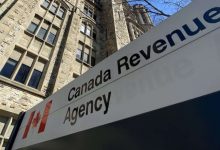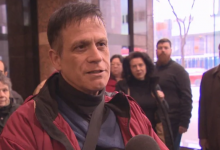How 5 community groups turned a $50K grant into $5.9M for low-income Torontonians
In just a few weeks, phones will be ringing non-stop at accounting offices across Toronto and the annual scramble for T4s will begin.
Tax season is upon us, and every year it’s the start of a hectic time for LAMP Community Health Centre in Etobicoke. They only cleared their waiting list from last season just a couple of months ago.
“We usually finish the tax season with a wait list of about 200 people,” said Natalia Semeekina, program supervisor of the Ask Community Information Centre at LAMP. The centre offers volunteer-run, free tax-filing services for low-income families and says they’re swamped every season — sometimes fielding 40 calls an hour.
“That waiting list doesn’t go away until I think about October of that same year.”
LAMP is one of five community centres that have quietly been helping some of the city’s most vulnerable people file their taxes and learn about rebates they’re eligible for. Many homeless or low-income residents don’t file their taxes, but don’t realize they’re leaving money on the table, said Semeekina.
“Even if you’ve made zero dollars, and you’ve paid no taxes, you’re still getting money back,” said Semeekina.
Three years ago, Toronto Neighbourhood Centres (TNC) — a network of nonprofits — received a grant from the United Way that stipulated $50,000 should go toward financial literacy. The TNC funnelled that money into free tax clinics for low income households at five community hubs, including LAMP.
Last year, the five centres helped more than 2,100 low-income residents get back nearly $6 million in tax refunds and rebates. But centres like these aren’t common and they lack the funding they need to expand.
‘A big difference’
For the nearly two decades that Jan Makacek worked as a long-distance truck driver, money was never an issue.
Seven years ago, that imploded when his left leg had to be amputated because of a bacterial infection: he lost his ability to drive trucks and hold a steady job.
“All my life, I was never on welfare … [losing my leg] was very hard for me … But what can I say? I still live,” said Makacek, who now gets around on a motorized scooter and regularly visits food banks.
LAMP has helped the 60-year old file his taxes for the past six years. He received about $1,000 in rebates for 2018.
“[It makes] a big difference, because I can spend this money for other stuff. For example, I can buy a jacket or stuff for my dog, or parts for my scooter.”
LAMP received approximately $7,000 from the TNC grant, which allowed the community group to ramp up its free tax services for people like Makacek who make $35,000 a year or less.
“We’ve had people that didn’t realize [that] and after doing their taxes after 10 years of not doing it, suddenly they have this big cheque,” said Semeekina, who said LAMP’s clients range from people who are homeless, to others who can’t afford to pay for someone over the years to file it for them.
Filing taxes, she said, also opens the door to other rebates — like the Canada Child Tax Benefit.
Specialized training
There are free tax clinics in Toronto, but many don’t have staff trained to offer services that cater specifically to low-income families.
“We train our volunteers and we train the organizations about the particular money matter issues that low-income people face,” said Lynne Woolcott, director of community response and advocacy with West Neighbourhood House, the organization that trains volunteers for the TNC program.
“So, that means that when they come into one of our tax clinics … they often learn about things that they didn’t know that they could access,”
The city doesn’t directly fund free tax clinics for low-income residents, but it does fund centres that operate them.
“There’s some work that’s being done in terms of financial literacy and problem solving … but it’s still more caught in a voluntary charity space rather than being a community program that’s available to everyone,” said Rob Howarth, the executive director for Toronto Neighbourhood Centres.
“It needs attention and expansion, for sure.”
City response
In a statement to CBC Toronto, the city said the 2020 budget includes more than $15 million in new investments in poverty reduction.
The city said it would consider specifically allocating money for free tax services by partnering with different groups.
“The Poverty Reduction Strategy Action 10.2 to integrate financial empowerment and literacy into the delivery of City Services provides this direction to explore new opportunities and partnerships,” the statement reads.
The TNC funding partnership with the United Way for the tax initiative is slated to continue for three more years. Woolcott said the hope is to expand the project beyond the five centres to 10, and to offer other financial problem-solving services to low-income residents. The organization has now put in an application for funding to the Trillium Foundation.
For now, the centres are ramping up volunteers for the upcoming tax season.
Every year, Semeekina says some of LAMP’s clients, after they get their rebates, decide to donate a small portion back to keep the program running.
“It’s actually been surprising how many donations we actually get from some of these folks who are so thankful,” said Semeekina.
“Sometimes it’s, you know, it’s maybe a dollar … So even when people have very little they want to give something back.”
CBC








Redes Sociais - Comentários